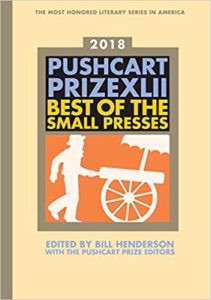NOTE: The 2019 Literary Magazine Rankings are available here.
Below are links to the 2018 Perpetual Folly Literary Magazine Rankings for Fiction, Poetry, and Non-Fiction. Scroll down for a discussion of the rationale and methodology behind the lists.
If you find the lists useful, please consider making a donation to support this site.
Literary Magazine Ranking — Fiction
Literary Magazine Ranking — Poetry
Literary Magazine Ranking — Non-Fiction
Rationale for the rankings. Years ago, when I was first submitting short stories to literary magazines, I wanted a way to tier my submissions. I believe in simultaneous submissions, but I didn’t want to submit a story to a great magazine and a not-so-great magazine at the same time because of the risk of multiple acceptances. (If the not-so-great magazine accepted first, it would pain me to withdraw the story from the great magazine.) Developing a ranking of literary magazines allowed me to submit only to those magazines in roughly the same tier. I began sharing the list on my blog because I knew other writers used the same tiered approach to submissions. Eventually, I added poetry and non-fiction rankings and also links to magazine websites.
Basis for the rankings. I base the rankings on the annual Pushcart Prize anthology that comes out in November. That anthology includes fiction, poetry, and non-fiction and excludes the magazines of general circulation like The New Yorker, Atlantic, Harper’s, and so on. Other anthologies, like the Best American series and the O.Henry Prize Stories are excellent books, but their approach to assembling their winners is different. As these things go, the Pushcart Prize anthology draws from a wide range of nominating magazines, which makes it the best choice for these rankings. One criticism of the Pushcart Prizes is that they have a print-publication bias. Although there are an increasing number of online publications earning recognition in the anthology, that bias is probably real. There are some fine online magazines that won’t appear on these lists, unfortunately.
Methodology. After several years of making these lists, I made a change last year that I have retained. Originally, I based the rankings on a ten-year rolling score that assigned a constant value for Pushcart Prizes earned over that period and a lower value for Special Mentions. Some readers suggested that a five-year rolling score would be better because it would result in newer publications rising in the rankings sooner. But reputations take years to develop, and I didn’t like the shorter period, while acknowledging the validity of the point. So last year I compromised. Now the formula assigns one value for Prizes and Special Mentions received in the most recent five years and half that value for Prizes received in the preceding five years.
Symbols. You’ll notice a few symbols next to the names of some magazines on the lists. (c) indicates a closed magazine; (w) indicates a broken link for a live magazine; and (?) indicates some question about the magazine or an unknown link.
Feedback and Support. I welcome your feedback. Let me know if you find a broken or incorrect link, either by leaving a comment or contacting me through this website. I don’t mind hearing criticism of my approach, either, if that’s what you want to share. (Praise is also welcome.) And if you find the lists at all useful, please consider making a donation to support the site. You’ll find a Donation button above and on each of the ranking pages.



Thank you
A little bit off-topic, but I’m just curious: are there stories that are published in both the Pushcart Prize and the BASS anthologies (or even in the annual O’Henry anthology)? Or do the editors of these volumes take steps to avoid overlap?
I haven’t examined the issue closely, but I don’t think the editors coordinate. I believe there is some overlap, although note that the Pushcart Prize does not include stories/poems/essays published in the big magazines like New Yorker, Atlantic, and Harper’s, all of which are represented in the other annual anthologies.
Thanks, Clifford. I sat down yesterday at a nearby bookstore and checked the table of contents of BASS 2016, BASS 2017, and O’Henry 2017 (they didn’t have any Pushcart Prize volumes). I discovered at least one story that BASS 2017 and O’Henry 2017 shared—so it seems the editors don’t coordinate, as you said. This rids the rankings of the distortion that may have come about by dropping stories so that others would use them in their anthology. Avoiding the big magazines gives the Pushcart selection its distinctive flavor.
I noticed you dropped the weekly New Yorker reviews from your website (this is probably explained in a blog post I missed). I don’t blame you. Sometimes luminous stories do crop in the big magazines (I recently discovered Charles Yu’s “Fable,” for instance), but much of the time the short fiction selection seems to respond more to promotion for big names or big books rather than to literary quality.
I did stop doing the New Yorker reviews, for several reasons, not least of which was that it became a burden. Also, so many of the stories are actually excerpts from forthcoming novels–it’s all about marketing, it seems–and reviewing such “stories” is rather pointless. Plus, fans of authors whose stories I didn’t care for left nasty comments, and I decided I didn’t need that!
PS: I just got the Pushcart Prize 2018 volume, and there’s at least one story that the three “best of” volumes have in common: “A Small Sacrifice for an Enormous Happiness,” by Jai Chakrabarti. It’s in BASS 2017, O’Henry 2017, and Pushcart 2018. Not bad at all for this author!